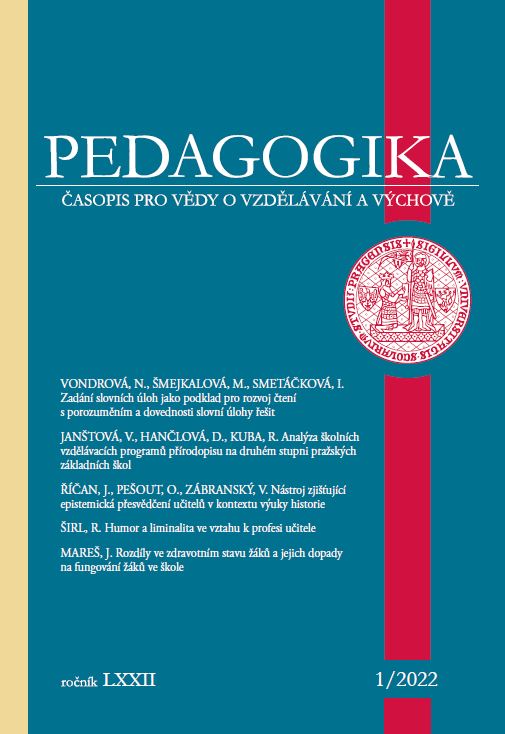Humour, Liminality, and Their Relevance for the Teaching Profession
DOI:
https://doi.org/10.14712/23362189.2021.1994Keywords:
humor, humour, education, instruction, school, teacher, pedagogue, liminal, liminality, communitas, laughter, ritualAbstract
This theoretical study is a contribution to the vast and often overlooked topic of humour and its relevance and role in the process of education and the school as an institution. The aim of this study is to develop these endeavours and describe the principles relating to a function of humour that is highly relevant to the aforementioned environment. This will then demonstrate that reflection on the nature and use of humour is a necessary part of the teaching profession.
The study begins with a brief introduction to the issue of defining humour and a relevant typology of theories of humour. Subsequently, current studies on the role of humour in education are discussed, with a special regard to a Czech monograph, Humor ve škole [Humour at School] by Klára Šeďová. Several conclusions from this work are then combined with the definitions of liminality and communitas in the works of Victor Turner and Radek Chlup. All these steps should provide a new perspective on this phenomenon and its functions.
In the last part of the study, previous findings are applied to the particularities of school environments and especially to the different roles connected with the profession of a teacher.
References
Banas, J. et al. (2011). A review of humor in educational settings: Four decades of research. Communication Education, 60: 115-144.
https://doi.org/10.1080/03634523.2010.496867
Bergson, H. (1993). Smích. Praha: Naše vojsko.
Bílá kniha. (2001). Národní program rozvoje vzdělávání v České republice: Bílá kniha. Praha: Ústav pro informace ve vzdělávání.
Block, B., & Hostettler, J. (1997). Hanging in the balance: A history of the abolition of capital punishment in Britain. Hampshire: Waterside.
Borecký, V. (2000). Teorie komiky. Praha: Hynek.
Brockmann, S. M. (2000). The politics of German comedy. German Studies Review, 23(1), 33-51.
https://doi.org/10.2307/1431428
Buber, M. (1969). Já a Ty. Praha: Mladá fronta.
Caillois, R. (1998). Hry a lidé. Praha: Nakladatelství Studia Ypsilon.
Douglas, M. (1975). Implicit meanings: Essays in anthropology. London: Routledge.
Fisher, M. (2010). Kapitalistický realismus, Praha: Rybka.
Fraley, B., & Aron, A. (2004). The effect of a shared humorous experience on closeness in initial encounters. Personal Relationships, 11(1), 61-78.
https://doi.org/10.1111/j.1475-6811.2004.00071.x
Freud, S. (2005). Vtip a jeho vztah k nevědomí, Praha: Psychoanalytické nakladatelství.
Gillernová, I., & Krejčová, L. (2011). Interakce učitele a žáků: dotazník pro žáky. Praha: Národní ústav odborného vzdělávání.
Gruner, C. R. (1997). The game of humor: A comprehensive theory of why we laugh. New Brunswick, NJ: Transaction.
Helus, Z. (2003). Učitelství - doména pedagogických ctností? Pedagogika, 53(4), 355-357.
Horvath, Á. (Ed.). (2015). Breaking boundaries: Varieties of liminality. New York: Berghahn.
https://doi.org/10.2307/j.ctt9qcxbg.4
https://doi.org/10.2307/j.ctt9qcxbg.8
Horváth, Á. (Ed.). (2015). Breaking boundaries: Varieties of liminality. New York: Berghahn.
https://doi.org/10.2307/j.ctt9qcxbg.4
https://doi.org/10.2307/j.ctt9qcxbg.8
Chlup, R. (2005a). Struktura a antistruktura: Rituál v pojetí Victora Turnera I-II. Religio: Revue pro religionistiku, 13(1), 179-197.
Chlup, R. (2005b). Vtip a náboženství: Posvátno jako mysterium ludicrum et ridiculum! Religio: Revue pro religionistiku, 13(2), 261-280.
Johnson, H. A. 1990. Humor as an innovative method for teaching sensitive topics. Educational Gerontology, 16(6), 547-559.
https://doi.org/10.1080/0380127900160605
Koestler, A. (1965). The act of creation. London: Hutchinson.
Kolman, V. (2020). Noc, v níž se pořádají medvědí hony na zajíce: filosofický původ jazykové komiky. Praha: Argo.
Komenský, J. A. (1992). Obecná porada o nápravě věcí lidských. Praha: Svoboda.
Lynch, O. H. (2010). Cooking with humor: In-group humor as social organization. Humor, 23(2), 127-159.
https://doi.org/10.1515/humr.2010.007
Mareš, J., & Křivohlavý, J. (1995). Komunikace ve škole. Brno: Masarykova univerzita.
Martin, R. (2007). The psychology of humor: An integrative approach. Amsterdam: Elsevier.
https://doi.org/10.1016/B978-012372564-6/50030-7
https://doi.org/10.1016/B978-012372564-6/50024-1
https://doi.org/10.1016/B978-012372564-6/50025-3
https://doi.org/10.1016/B978-012372564-6/50022-8
https://doi.org/10.1016/B978-012372564-6/50027-7
https://doi.org/10.1016/B978-012372564-6/50023-X
https://doi.org/10.2117/psysoc.2007.110
https://doi.org/10.1016/B978-012372564-6/50021-6
https://doi.org/10.1016/B978-012372564-6/50026-5
https://doi.org/10.1016/B978-012372564-6/50020-4
https://doi.org/10.1016/B978-012372564-6/50028-9
https://doi.org/10.1016/B978-012372564-6/50029-0
Nerdwriter1. https://www.youtube.com/user/Nerdwriter1/videos
Orlický, J. (2003). Záhady komična: teorie komična, vtipu, gagu a smíchu. Praha: Futura.
Průcha, J. (2005). Moderní pedagogika. 3., přepracované a aktualizované vydání. Praha: Portál.
Roberts, A. (2019). A philosophy of humour. New York: Springer.
https://doi.org/10.1007/978-3-030-14382-4
RVP-G. (2007). Rámcový vzdělávací program pro gymnázia. Praha: VÚP.
RVP-PV. (2021). Rámcový vzdělávací program pro předškolní vzdělávání. Praha: VÚP.
Říčan, P. (1995). Agresivita a šikana mezi dětmi: jak dát dětem ve škole pocit bezpečí. Praha: Portál.
Sedlák, J. 2006. Vytváření pozitivního školního klimatu. Humor ve škole. Pedagogická orientace, 16(3), 69-73.
Stanford Encyclopedia of Philosophy. https://plato.stanford.edu
Šeďová, K. (2011). Mocenské konstelace ve výukové komunikaci. Studia paedagogica, 16(1), 89-118.
https://doi.org/10.5817/SP2011-2-13
Šeďová, K. (2012). Pedagogické efekty humoru ve výukové komunikaci. Pedagogika, 62(4), 426-441.
Šeďová, K. (2013). Humor ve škole. Brno: Masarykova univerzita.
Šíp, R. (2019). Proč školství a jeho aktéři selhávají: kognitivní krajiny a nacionalismus. Brno: Masarykova univerzita.
https://doi.org/10.5817/CZ.MUNI.M210-9378-2019
Štech, S. (1994). Co je to učitelství a lze se mu naučit? Pedagogika, 44(4), 310-320.
Turner, V. (1982). From ritual to theatre: The human seriousness of play. New York: PAJ.
Turner, V. (2004). Průběh rituálu. Brno: Computer Press.
van Gennep, A. (1997). Přechodové rituály. Praha: Lidové noviny.
Wanzer, M. B., & Frymier, A. B. 1999. The relationship between student perceptions of instructor humor and students' reports of learning. Communication Education, 48, 48-62.
https://doi.org/10.1080/03634529909379152
White, E. B. (Ed.). (1962). A subtreasury of american humor. New York: Capricorn Books.
Wittgenstein, L. (1993). Filosofická zkoumání. Praha: Filosofický ústav AV ČR.
Ziv, A. (1988). Teaching and learning with humor: Experiment and replication. Journal of Experimental Education 57, 5-15.



